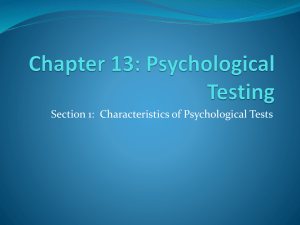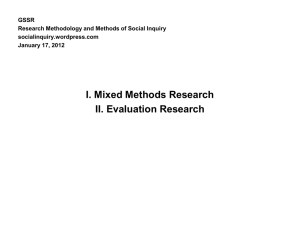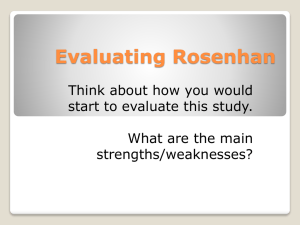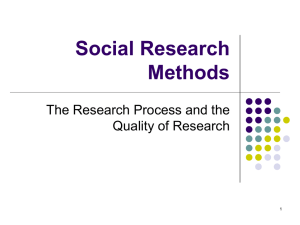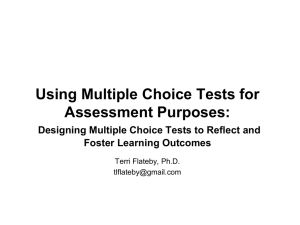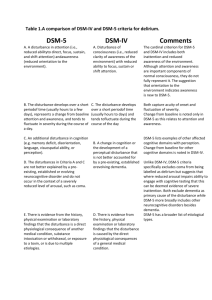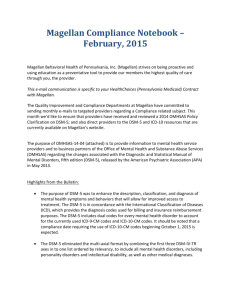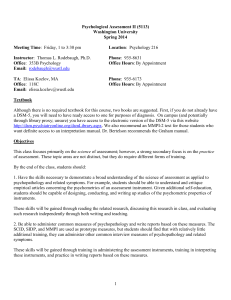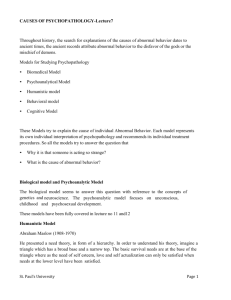Psychological Assessment - Francis Marion University
advertisement
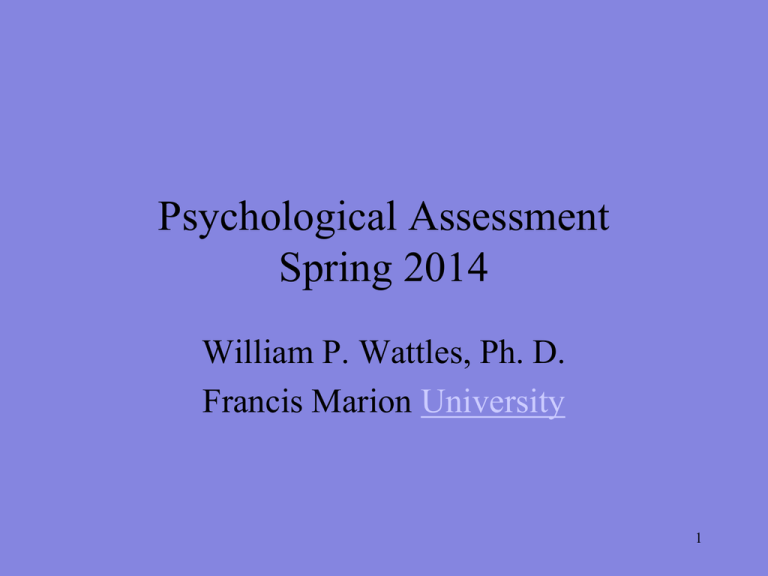
Psychological Assessment Spring 2014 William P. Wattles, Ph. D. Francis Marion University 1 Psycholgical Assessment 2 • "When I die, I want to die like my grandfather who died peacefully in his sleep. • Not screaming like all the passengers in his car." 3 Quantitative Reasoning • Number Thinking – scale 4 Human Behavior • Individual differences – Predict – Understand – Change 5 “The single most critical piece of equipment is still the researcher's own brain. All the equipment in the world will not help us if we do not know how to use it properly, which requires more than just knowing how to operate it. Aristotle would not necessarily have been more profound had he owned a laptop and known how to program. What is badly needed now, with all these scanners whirring away, is an understanding of exactly what we are observing, and seeing, and measuring, and wondering about.” - Endel Tulving, 2002 Psychology • The science that deals with mental processes and behavior. 7 8 Welcome to Assessment • • • • • Valuable skill Lots of work Three texts Quizzes 4-6 reports 9 What personal experiences have you had with generalities? • Profiling • Stereotypes 10 Generalize • The Academy of Behavioral Profiling is a professional association dedicated to the application of evidence based criminal profiling techniques within investigative and legal venues. • http://www.profiling.org/ • The American Civil Liberties Union today called on lawmakers to investigate the actions of air marshals who handcuffed and detained a 54-year-old Florida doctor of Indian descent because they “didn’t like the way he looked.” 11 Generalize • a. To reduce to a general form, class, or law. • To form a concept inductively. 12 13 What constitutes psychological assessment? How are we different from palm readers? Tea leaf readers? 14 What constitutes psychological assessment? 15 Science • Dr. Michael Shermer will give the Hunter Lecture on 20 March 2012 (a Tuesday), at 7:30PM in the Lowrimore Auditorium. • Everyone is also welcome to attend a colloquium on 21 March at 11:30AM in the Lowrimore Auditorium. Dr. Shermer will discuss Why People Believe Weird Things with students reading it for their classes. 16 Clinical Judgment • What are the implications of relying on clinical judgment vs. actuarial data? 17 Perception vs. Sensation • Sensation one to one relationship with stimulus • Perception interprets sensation with historic and other information. 18 19 20 21 22 Is assessment useful? • Pay for nothing. Shouldn’t we just treat? • May not be useful unless it relates to the problem and is presented in a timely and useful manner. 23 Importance of assessment • The theory and instruments of assessment are the foundation of clinical investigation, applied research and program evaluation. • In the early 1700’s Linneaus described a case of aphasia so well that it could easily be diagnosed today. 24 What constitutes psychological assessment? • Careful Observation – trained to observe – inference based on experience and training • Interview • Testing • History and other sources 25 Role of the clinician • Clinicians must integrate a wide range of data and bring into focus diverse areas of knowledge. • Reports should be: • • • • accurate effective concise highly valued by the recipient 26 Assessment best practices • Assessment is good only if: – – – – – Competence Privacy Informed consent Appropriateness Feedback 27 Feedback and assessment • What happens if we give feedback to patients? • Do they give us feedback? 28 Computer aspects of class • First assignment send me an e-mail • Psy631 on subject line • Sign the e-mail • Submit reports as Word files attached to e-mail 29 Three texts • Assessment important and the texts are all references 30 Handbook of Psychological Assessment • Reference book • Instructional text • Organized along the sequence followed when performing an evaluation--practical in nature. • Goal: a realistic appreciation of the assets and limitations of assessment. 31 DSM-5 • Official nomenclature • Designed first to be a helpful guide to clinical practice. – Brief – clear – explicit • Also designed to further research and support teaching. 32 DSM-5 • Used by different practitioners: psychiatrists, other physicians, psychologists, social workers, nurses, OT and RT, counselors • Used by clinicians and researchers with different orientations: behavioral, biological, psychodynamic, cognitive and family systems. 33 DSM-5 • The work of a hierarchical committee. • Input from 60 organizations • 13 work groups reported to 33 members of the task force. 34 MMPI-2 Assessing Personality and Psychopathology • Textbook for graduate courses and also a reference guide for professionals. • The guiding principle in the book is presenting the material in a way that enhances learning and clinical use of the most widely used personality inventory. 35 Evaluating Psychological Tests • Mental Measurements yearbook • Theoretical orientation – the construct being tested • Practical considerations – cost – reading level, time to administer – training needed 36 Evaluating Psychological Tests • Standardization – adequate norms – administration • Reliability • Validity • If you choose the test it is unethical not to evaluate it. 37 Reliability • Measurement error is always present • Goal of test instruction is to minimize measurement error • Reliability is the extent to which the test measures consistently • If the test is not reliable it cannot be valid or useful. 38 Reliability • • • • Test-retest Alternate form split-half interscorer reliability 39 Validity • Does the test measure what it purports to measure? • More difficult to determine than reliability • Generally involves inference 40 Validity and Learning Styles • Learning-styles hypothesis • Meshing hypothesis 41 Validity • Content validity-does it cover the entire construct? • Face validity- does it appear to measure what it purports to measure. Not essential • Criterion validity – concurrent – predictive • Construct Validity 42 Validity in Clinical Practice • Incremental Validity-what does this test add? • Conceptual Validity• Collect data • Form many hypotheses • Look for consistent trends 43 Improving clinical accuracy • • • • • • • Use structured interviews Consider disconfirming evidence Use DSM-5 specific criteria Take notes attend to base rates seek feedback read the literature 44 Phases in Clinical Assessment • • • • Evaluating the referral question Consider the content of the problem Data collection Interpreting the data 45 Initial Data Collection Phase 1 Developoment of Inference Phase 2 Reject Inferences Phase 3 Modify Inferences Phase 3 Accept Inferences Phase 3 Develop and Integrate Hypothesis Phase 4 Dynamic Model of Person Phase 5 Situational Variables Phase 6 Prediction of Behavior Phase 7 46 DSM-5 introduction • We diagnose disorders not people • a schizophrenic • an individual with schizophrenia 47 mental disorder • Not mere deviance 48 mental disorder • A clinically significant behavioral or psychological syndrome that is associated with present distress or disability (impairment in social or occupational functioning) or with a significant risk of suffering death, pain, disability or important loss of freedom. • Not culturally sanctioned (i.e. bereavement) 49 Classify disorders not people • DSM-5: What are being classified are disorders not people. 50 Enforcement push • FBI • Sampling of records – many lacked sufficient documentation of medical necessity • If it isn’t documented it didn’t happen • Practitioners should aim for meticulous compliance 51 Type I and Type II errors 52 Type I error • If we reject Ho when in fact Ho is true. 53 Type II Error • If we fail to reject Ho when in fact Ho is false 54 Employee Polygraph Protection Act of 1988 • An employer … cannot, in any manner or for any reason, have an employee or prospective employee submit to a polygraph test • The act does not apply to the federal government who may use the polygraph in the interests of national security for counterintelligence purposes. 55 The End 56

